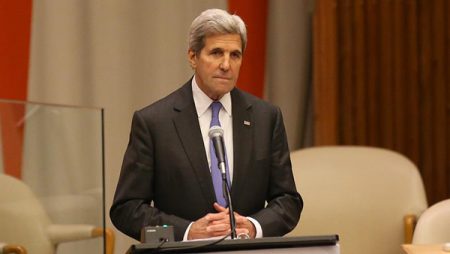Israel cannot have both, US Secretary of State John Kerry said, in unprecedented comments, Sunday, at the annual Saban Forum hosted by the Brookings Institution, in Washington DC.
“There is no status quo. It is getting worse,” said Kerry, according to Al Ray, referring to the Israeli-Palestinian conflict. “It is moving in the wrong direction.”
Kerry, who has described himself as an “unapologetic friend of Israel”, said that Tel Aviv is, nonetheless, “ignoring all our warnings regarding settlements”.
“There is a basic choice that has to be made by Israelis, by the leadership of Israel,” he said, “and that is are there going to be continued settlements, is there going to be a continued implementation of settlement policy, or is there going to be separation and the creation of two states?”
Still, the top diplomat said that the “tipping point” between the alternatives had not yet been crossed.
The comments are some of the sternest to date from the US, Israel’s staunchest ally on the international stage.
The Obama administration recently agreed to increase Israel’s foreign military financing to $3.8 billion per year for the next decade, from $3.1 billion.
But Israel cannot broker a separate peace with the Arab world if it does not move toward a Palestinian state, Kerry said.
“That is a hard reality,” Kerry said.
Israeli premier Benjamin Netanyahu has long insisted that his government is committed to a two-state solution, but Palestinians have criticized his policy of settlement expansion as a major impediment to the realization of their state.
As recently as March of 2015, shortly before his re-election, Israeli Prime Minister Benjamin Netanyahu said that he would not allow a Palestinian state, if re-elected, effectively reneging on his 2009 endorsement of a two-state solution.
During the 2013 Israeli-Palestinian peace talks led by US Secretary of State John Kerry, Israeli officials announced and, eventually, carried out in full force, plans to build thousands of additional homes in illegal settlements across the occupied West Bank, while continuing to further seize lands, demolish homes and agricultural resources and, thus, leaving scores of Palestinian families severely disenfranchised and without so much as a roof over their heads to shelter them from inclement weather.
Gazans were already surviving on a mere 8 hours per day of electricity when the Palestinian negotiating team finally resigned in protest, in mid-November. Israel, soon after, made quite clear its position on securing peace with Palestinians when Israeli PM Benjamin Netanyahu, during a meeting with young Likud Party supporters, boasted:
“I was threatened in Washington: ‘not one brick’ [of settlement construction] … after five years, we built a little more than one brick…”
Asked about ‘peace talks with the Palestinians”, the PM reportedly replied, according to +972 online Israeli magazine: “about the – what?” to which his audience responded with a round of chuckling.
Netanyahu also vowed, in recent days, that he would never allow the Palestinian people to have East Jerusalem as their future capital and pledged to build “thousands” of settler units across the city.
Kerry emphasized that settlements are a “barrier to peace” with the Palestinians.
“Out of the mouths of ministers, in the current government, have come profoundly disturbing statements publicly,” he said, referring to statement dismissing a Palestinian state. “This is the predicament. This is where we find ourselves,” he added.
Search IMEMC: “John Kerry”

